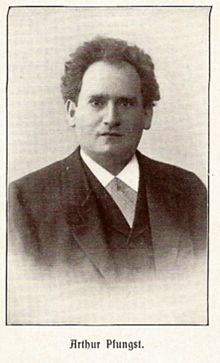Arthur Pfungst
Arthur Pfungst (pseudonym: Arthur Cornelius ; born March 9, 1864 in Frankfurt am Main ; † October 3, 1912 in Frankfurt am Main) was a German manufacturer, publisher, poet, translator, Buddhist and free thinker.
family
Arthur Joseph Pfungst was born as the son and second child of the tobacco shop Julius Pfungst and his wife Rosette Bertha Pfungst, née Oppenheim. His siblings were his older sister Marie Eleonore (1862-1943), his younger brother Moritz Julius (born October 11, 1866; † 1894) and his younger sister Hedwig Auguste (born January 24, 1870).
Life
After completing his doctorate in chemistry and mathematics in 1886, Arthur Joseph Pfungst joined the Naxos-Union company , which he managed as a co-owner after the death of his father. In addition, Pfungst studied ancient Indian literature and philosophy and worked as a translator and editor of numerous fundamental works of Buddhist culture; u. a. In 1889 he translated the Sutta Nipata Uravagga into German and in 1906 published Robert Boxberger's Bhagavadgita with Sanskrit text and glossary. Under the pseudonym Arthur Cornelius , he published poems that were translated into Italian in 1900, later also into English and partly into the planned language Unial Heinrich Molenaars . Pfungst's main concern, however, was to promote the anti-denominational and free-thinking movement, for which he created a platform with the semi-monthly publication “The Free Word”, which appeared in 1901. His essay "The Union of Free Spirits", which appeared there, contributed significantly to the merger of the German Monist Association , the Freethinkers Association, the Association for Secular Schools and Education , the German Society for Ethics and Culture and some other organizations in the Weimar cartel , which he supported in 1911 elected first chairman. Pfungst was a member of the Royal Asiatic Society , an honorary member of the Mahdbodhi Society in Calcutta and the International Buddhistic Society in Rangoon . After Arthur Pfungst's death, his sister, the women's rights activist Marie Eleonore Pfungst , took over the family business.
Works
- On the effect of nitroethanes on the chlorohydrins of polyhydric alcohols, Dissertation Leipzig 1886
- The Sutta Nipata, 1889
- The political division of Africa according to the latest international agreements (1885–1889), 1890
- New poems, 1894
- Poetry scelte di Arturo Pfungst, transl. v. L. di San Giusto, 1897
- A German Buddhist, 1899
- Buddhism, A Presentation of the Life and Teachings of Gautama the Buddha, (n.d.)
- The religion of the future, Ed. Th. Schütze, 1901
- From the Indian cultural world, 1904
- GE Lessing, Anti-Goeze, 1905
- Poems by Arthur Pfungst, trans. v. EFL Gauss, 1906
- In Yama's realm, 1909
- Collected works, 3 vols., Ed. v. F. Angermann, E. Doctor et al. Marie Eleonore Pfungst, 1927
Board functions
- Weimar cartel
- Association for Secular Schools and Moral Education
Memberships
- Royal Asiatic Society
- Maha Bodhi Society
- International Buddhist Society
Honors
In Frankfurt am Main, Pfungststraße in Ostend was named after him. The street name was renamed by the National Socialists and was differently designated between 1935 and 1954.
literature
- Pfungst, Arthur. In: Lexicon of German-Jewish Authors . Volume 17: Meid – Phil. Edited by the Bibliographia Judaica archive. De Gruyter, Berlin a. a. 2009, ISBN 978-3-598-22697-7 , pp. 456-462.
- Dieter Rebentisch: Pfungst, Arthur. In: New German Biography (NDB). Volume 20, Duncker & Humblot, Berlin 2001, ISBN 3-428-00201-6 , p. 367 f. ( Digitized version ).
Web links
- Literature by and about Arthur Pfungst in the catalog of the German National Library
Individual evidence
- ^ Arthur Pfungst on: deutsche-biographie.de, accessed on August 2, 2015
| personal data | |
|---|---|
| SURNAME | Pfungst, Arthur |
| BRIEF DESCRIPTION | German manufacturer, publisher, poet, translator, Buddhist and free thinker |
| DATE OF BIRTH | March 9, 1864 |
| PLACE OF BIRTH | Frankfurt am Main |
| DATE OF DEATH | October 3, 1912 |
| Place of death | Frankfurt am Main |
